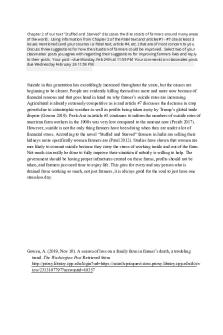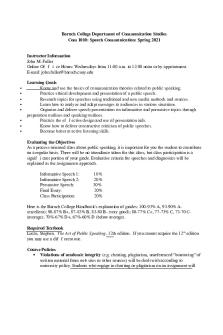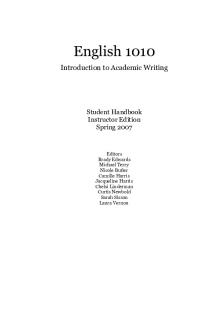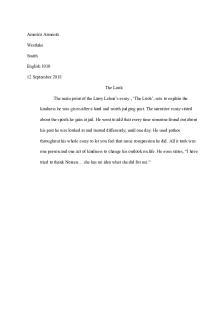Kantanis - Grade: 10/10 PDF

| Title | Kantanis - Grade: 10/10 |
|---|---|
| Course | Integrating Business Perspectives |
| Institution | University of Technology Sydney |
| Pages | 9 |
| File Size | 210.6 KB |
| File Type | |
| Total Downloads | 24 |
| Total Views | 139 |
Summary
Kantanis Study on First year transition for uni students...
Description
The role of social transition in students’ adjustment to the first-year of university Tanya Kantanis
Abstract This paper, based on research conducted at the main campus of a large Australian multi-campus university, explores the role of social transition in students’ adjustment to the first-year of university. Although traditionally academic achievement has been the measure of success in the first-year of tertiary studies, this research indicates that students who do not have a positive experience in making the social transition at university face increased difficulty in negotiating their way through the challenges of first-year. Due to the increasingly changed nature of the ‘first-year student’ — a consequence of societal and higher educational changes, especially in the last twenty years — the responsibilities of academics have also changed. Particularly for those taking tutorials, demonstrations, laboratory practicals, etc. ‘networking’ these classes to facilitate students’ social transition as part of the first-year experience at university should be an integral part of the teaching program.
Introduction The first-year university experience of a significant number of students is neither satisfying (in terms of personal fulfillment) nor successful (if academic achievement is the measure). The final year of secondary schooling identifies the most academically able students to undertake tertiary study. Why then, do approximately one third of students drop out in the first-year of university? Moreover, why do even those students who do proceed achieve relatively less well than the Equivalent National Tertiary Entrance Rank (ENTER) would indicate, and fail to complete in minimum time? A frequent response from past researchers to these disturbing issues has been to apportion blame — this has been directed at the students themselves, and secondary schools — the institutions from which the students have come. In 1957 Matthews said: ‘The temple of learning has many floors but one thing is common to those in charge of every floor — they are dissatisfied with the training on the floor below. It is what you might call an endemic complaint’ (1957: 116 cited by Genn, 1971: 7). This still holds true. In this very mould, Power et al state: ‘At the higher education level, academics often complain about inadequacies in the backgrounds of school-leavers and their lack of commitment to their course’; ‘There are serious academic problems among the younger and academically less well motivated and prepared students ...‘; ‘... the most serious problems identified relate to the low course commitment and lack of preparation of younger students in non-professional courses ...‘; ‘Schools have the role of preparing students academically ...‘; and ‘The type of education provided in some secondary schools can leave students poorly prepared to adjust to the new demands of higher education’ (1987: 2; 40; 42; 48; 50). Power et al are not alone in expressing such views. More recently, in a survey of academics from universities across Australia, McInnis et al found that these same sentiments are not only still being echoed by academics but that: ‘Dissatisfaction with the academic quality of students more than doubled between 1978 and 1993 ... Indeed, less than a third of academics in 1993 were satisfied with the academic quality of students’ (1995: 5).
In today’s mass education environment, it is not productive to pursue this line of argument that has at its foundation the view that secondary schools exist primarily as preparatory agents for an elite group of students to gain university entry. The shift to a mass education tertiary landscape has created greater diversity, in terms of ability, motivation, interest, commitment, maturity, social skills, etc. of the student population. This necessitates a re-evaluation of academics’ expectations of first-year students, a re-conceptualisation of first-year students and the qualities they bring to the university, and a reconstructed understanding of the needs students have which the university should meet. Some progress has already occurred. Universities have acknowledged the need for counselling, disability, language and learning services, etc. and established these resources within higher education institutions. Such measures have, however, come only a small way in dealing with the issues that affect students because they are removed from students’ most common point of contact: academic staff. The world in which today’s students have grown up is vastly different from that of a generation ago. Changes have occurred at an accelerated rate. Everyday living is more fast-paced; culture is visual and technologically driven; communicative competence and social skills have been eroded; life is a complex web, not the linear progression that it once was. This lack of stasis inevitably means that, along with everything else, the role and responsibilities of the university teacher need to be reviewed and undergo change. This is not a notion that sits comfortably with many academics, as is evident from the comments of McInnis et al above. This research indicates that academics who interface most directly with first-year students will need to take a proactive role in the networking of tutorial, seminar, demonstration, laboratory practical, etc. classes to enhance students’ prospects of social transition, including enculturation into the life and practices of the university. In an economically rationalist world this is not an unrealistic expectation for the paying customer to have.
The study: its method and key findings In 1996 a pilot study — the precursor of what was later to develop into a much larger investigation — sought to explore the views of first-year students upon commencement of their studies at the main campus of a large multi-campus university. The sample was comprised of Arts undergraduates taking first-year English. The general characteristics of this sample included a lower ENTER than for more professionally oriented courses with vocational motivation being of less significance. The majority (66.0 %) was school-leaver students. The nature of their university experience included lack of a fixed cohort with whom to establish social networks (due to the fact ‘core’ subjects are not a part of the Arts course structure), large classes and relatively few contact hours compared with those of students in professional courses. A detailed questionnaire, comprised of multiple-item indicator questions as well as structured (closed and scaled) and unstructured (open-ended) questions, was distributed to 100 students; 57 responses were obtained. (The larger study currently being undertaken with more than 1600 respondents from all faculties and campuses seeks to ascertain whether the features identified in this sample will be replicated on a broader canvas.) The data collected from the questionnaires in the pilot study were analysed in the following manner. The structured (closed and scaled) questions, which generated quantifiable results, were tabulated as frequency and percentage distributions with mean, median and standard deviation statistics (where applicable). The unstructured (open-ended) questions used to encourage discursive comments were initially recorded verbatim and then used to draw on for globalised remarks or selected to be reproduced verbatim to highlight either indicative comments that pertained to a substantial proportion of the group or highly idiosyncratic observations. The non-response bias in this survey was negligible. The most common expectations these first-year students had of university prior to commencement can be categorised broadly as: n
meeting new and different people;
n
having fun;
n
enjoying the freedom of a learning environment that is not regimented in the same way as school;
n
being mentally stimulated by all the new experiences; and
n
having the opportunity to explore greater and more interesting subject choices.
The most striking feature of these responses is the emphasis on social aspects of university life rather than academic achievement. Sadly, a substantial 69.6 % of the sample indicated that less than half of their expectations had been realised. The main factors affecting the full realisation of student expectations were: n
that making friends had proved to be difficult;
n
disappointment in discovering that university was not as interesting, exciting and as much fun as they expected it to be or had been led to believe;
n
that staff were not as accessible as expected;
n
a much heavier workload than expected; and
n
the unexpected complexity of some subjects.
A combination of the strong social emphasis of students’ preconceived expectations and the high proportion who felt these expectations had not been realised, was evident in that almost half of the respondents (49.1 %) had not experienced success in the establishment of a friendship group by the end of Semester 1. At a time that may be filled with considerable apprehension and dislocation, the inability to identify with others in similar circumstances can be a particularly alienating experience. Lack of organisation, in terms of competing demands (49.1 %), and time (63.2 %), adversely affected academic progress. This may be attributed to the highly teacher-directed learning of the secondary school context. What is more disturbing, however, is that even after a full semester a substantial proportion of students (38.6 %) did not believe they had adapted to become independent learners, and more than one third (35.1 %), had not accommodated to the teaching styles employed at university. Development (or lack) of a friendship network featured as a critical factor in students’ level of adjustment. Despite the fact that a sizable number of students experienced some difficulty in adjusting to university life they were reticent to discuss their concerns with anyone. Only 57.5 % were prepared to do so. Of those who were prepared to discuss the difficulties they were experiencing, the vast majority chose friends at university with whom to share the burden of these concerns. The most common justification for the selection of these individuals as confidants was ‘friends going through the same difficulties’ with whom they ‘felt comfortable’. What students needed was the opportunity to express concerns and vent frustrations rather than seeking expert counselling; the issues that concerned them were not seen as being of such significance as to warrant professional attention. In most cases it was moral support that was being sought, a case of the old adage: ‘a trouble shared is a trouble halved’. Thus, reinforcing the significance of social transition as a great need that students require to have fulfilled, especially in the initial experience of first-year at university.
Social transition matters Social transition underpins a successful academic transition to university. This research highlighted that the development of a friendship network was a major contributory element in this process. The sample indicated clearly that not having friends made the whole process of transition to university more difficult, whilst having friends helped students to settle in quickly and make progress with their studies. Establishing and maintaining a friendship network requires fairly sophisticated social skills that are complemented by an outgoing personality; not all first-year students possess these attributes. Therefore, despite expressing the desire to make friends, for some students there are very real impediments in the achievement of this goal. Comments such as, ‘nothing to do at lunchtime’ and ‘few friends etc.’ reflect the grimness of this daily reality for first-year students. The need to belong is one of the core desires that shapes human behaviour: for adolescents this need is magnified. It is for this reason that the establishment
and maintenance of friendship networks is of particular importance. Without friends, students have fewer resources at their disposal to assist them in the process of transition to university. Especially for first-year students undertaking subjects with large cohorts, little likelihood of having subjects in common and few contact hours, as was the case with the sample in this instance, an inherent feature of the lecture experience is isolation which is often translated to the broader university context. For those first-year students who have found it difficult to make friends, the repercussions of the inability to form friendship networks are immense. Lack of such social networks can: n
undermine self-confidence and self-esteem;
n
inhibit the development of socialisation skills and communicative competence;
n
preclude discussion of subjects’ ‘big ideas’;
n
preclude discussion of assigned texts/tasks and analysis of subject matter in the non-threatening environment and risk-taking environment of a learning community;
n
preclude discussion on assigned texts/tasks for clarification and enhanced understanding;
n
prohibit students from acting as ‘critical friends’ by providing feedback on each other’s work prior to submission;
n
prevent students from revising collaboratively for tests/examinations;
n
increase the difficulty of obtaining scant resource material;
n
prevent students from offering assistance, guidance, encouragement and emotional support to one another;
n
reduce persistence due to lack of group identification and established camaraderie;
n
restrict the speed of familiarisation with the university’s, services, facilities and resources;
n
reduce the prospect of enculturation into the university’s life and practices;
n
negate collaborative discussion of academic and personal concerns and resolution of these difficulties;
n
negate the sharing of experiences, time and confidences;
n
preclude the expression of fears, the review of expectations and the celebration of achievements; and ultimately
n
reinforce feelings of negativity toward the institution, others and self.
Developing friendship networks in first-year is an imperative. For this sample, the face-to-face contact hours were minimal compared with, for example, students studying Medicine or Pharmacy. They had a lot of time on their hands — time to spend with friends socialising and/or extending their understanding of subject matter as part of a learning community; to be alone and undertake independent study; or simply to feel lonely. For first-year students, whose socialisation skills are not well developed, excess time can be their worst enemy.
The need for realistic expectations of the first-year experience by academics and students
Adjusting to the life and culture of university usually takes time and effort due to the considerable differences between the educational environments of secondary school and the university and the experiential nature of transition. School-leaver students’ educational experience involves close scrutiny of work through the drafting process; immediate feedback couched in positive language; objective, criterion-referenced assessment and high grades. At university little guidance is provided on task completion compared to that at school, draft work is considered to be unacceptable (although some discussion of work may be deemed appropriate) and low grades appear to feature, especially in the early stages prior to accommodation to university teaching and learning styles. This frequently occurs because assessment is norm rather than criterion referenced. Furthermore, although independent learning is a common expectation that academics, more often than not, have of first-year students, what this actually means and how students can meet this expectation is seldom made explicitly clear to them. Certainly, students do need to become independent learners, however, they cannot accomplish this unassisted and immediately upon entering university. As with all learning, the skills of independent learning need to be developed over time with an appreciation of discipline-specific requirements. The process of independent learning needs to be a cumulative progression — it is unrealistic to expect otherwise. It is unrealistic expectations, on the part of both academics and first-year students, that have produced what is referred to in the literature as: ‘attrition’, ‘wastage’, ‘drop out’, ‘fall out’, ‘withdrawal’, ‘failure’ and ‘non-persistence’. Students are more likely to experience academic success and personal fulfillment at university if there has been recognition and appreciation of the following: n
expectations of the university and of self need to be realistic;
n
reasonable effort needs to be expended by the individual student to negotiate initial feelings of alienation, isolation, dislocation, dissonance, etc.;
n
the nature of learning and teaching at university is different from that experienced at secondary school;
n
the culture of university differs from the ethos of secondary schools;
n
independent learning is an expectation academics have of students at university;
n
active involvement in learning communities enhances social and academic transition;
n
the freedom of independence and the responsibility of being treated as an adult are codependent;
n
a balance needs to be struck between the competing demands of university study, social life and paid employment;
n
the responsibility of asking for information, assistance and (if need be) reassurance rests with the student; and
n
development of social networks within and beyond the classroom has more far-reaching implications than merely that of having made friends.
The profile of first-year students School-leaver, first-year students typically experience a sense of apprehension and loss but also excitement at the prospect of commencing university studies (many of these feelings are also common amongst non school-leaver students). Most first-year students overlook the fact that others share their anxieties, believing that they alone feel alienated, especially if they are the only student from their school to be attending a large university campus, and not familiar with it. Limited contact with other students and academic staff tends to reinforce students’ isolation. Anxiety is natural — especially when it appears as if everyone else knows where to go and what to do and terminology used and taken for granted by university staff is unfamiliar, for example: ‘major’ and ‘minor’ sequences, ‘points’, ‘honours’, etc. — few,
however, would admit this freely. Almost all students are concerned that the style and pace of teaching and learning is different from that experienced at secondary school. First-year students are particularly overwhelmed by the sheer volume of reading that has to be completed in a relatively short space of time. Assigned written work is particularly intimidatory by virtue of its assessment weighting, and the fact that most of it falls due in the latter part of the semester — often precluding feedback prior to examinations, and creating a time management nightmare with several pieces due at about the same time. Significant numbers of commencing students are unsure of what is expected of them in lectures and tutorials/seminars, and at a more fundamental level, require direction on manner of address, and appropriate interaction with lecturers and tutors. Students, especially those who are ‘pioneers’, that...
Similar Free PDFs

Kantanis - Grade: 10/10
- 9 Pages

AG 1010
- 2 Pages

COM 1010 Syllabus
- 12 Pages

English-1010-handbook
- 68 Pages

Jv-1010 - Manual español
- 94 Pages

1010 WKW12 - USYD
- 4 Pages

History 1010 lecture 12
- 6 Pages

Narrative Analysis-English 1010
- 1 Pages

ECON 1010 Course Outline
- 8 Pages

ECON 1010 Notes
- 36 Pages

Huma 1010 - huma 1
- 2 Pages

Psych 1010 notes-Senses
- 3 Pages

Summary 6 English 1010
- 3 Pages

HIST 1010 Final
- 16 Pages

Psych 1010 notes-Behavior
- 2 Pages
Popular Institutions
- Tinajero National High School - Annex
- Politeknik Caltex Riau
- Yokohama City University
- SGT University
- University of Al-Qadisiyah
- Divine Word College of Vigan
- Techniek College Rotterdam
- Universidade de Santiago
- Universiti Teknologi MARA Cawangan Johor Kampus Pasir Gudang
- Poltekkes Kemenkes Yogyakarta
- Baguio City National High School
- Colegio san marcos
- preparatoria uno
- Centro de Bachillerato Tecnológico Industrial y de Servicios No. 107
- Dalian Maritime University
- Quang Trung Secondary School
- Colegio Tecnológico en Informática
- Corporación Regional de Educación Superior
- Grupo CEDVA
- Dar Al Uloom University
- Centro de Estudios Preuniversitarios de la Universidad Nacional de Ingeniería
- 上智大学
- Aakash International School, Nuna Majara
- San Felipe Neri Catholic School
- Kang Chiao International School - New Taipei City
- Misamis Occidental National High School
- Institución Educativa Escuela Normal Juan Ladrilleros
- Kolehiyo ng Pantukan
- Batanes State College
- Instituto Continental
- Sekolah Menengah Kejuruan Kesehatan Kaltara (Tarakan)
- Colegio de La Inmaculada Concepcion - Cebu
